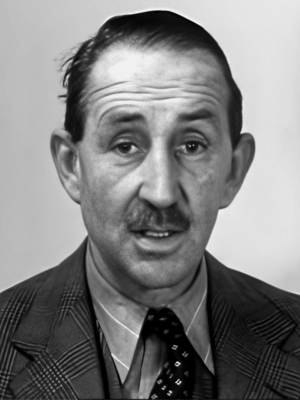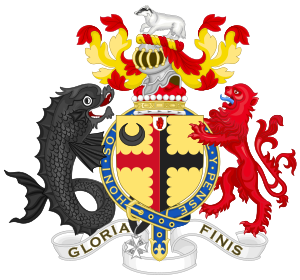Basil Brooke, 1st Viscount Brookeborough facts for kids
Quick facts for kids
The Viscount Brookeborough
|
|
|---|---|

Brooke in 1941
|
|
| 3rd Prime Minister of Northern Ireland | |
| In office 1 May 1943 – 26 March 1963 |
|
| Monarch | George VI Elizabeth II |
| Governor |
|
| Preceded by | J. M. Andrews |
| Succeeded by | Terence O'Neill |
| 6th Lord Lieutenant of Fermanagh | |
| In office 26 April 1963 – February 1969 |
|
| Monarch | Elizabeth II |
| Preceded by | Earl of Enniskillen |
| Succeeded by | Vacant (1969–71) Thomas Scott (1971–76) |
| 6th Leader of the Ulster Unionist Party | |
| In office 1 May 1946 – 25 March 1963 |
|
| Preceded by | J. M. Andrews |
| Succeeded by | Terence O'Neill |
| Minister of Commerce | |
| In office 16 January 1941 – 16 February 1945 |
|
| Prime Minister |
|
| Preceded by | John Milne Barbour |
| Succeeded by | Roland Nugent |
| Minister of Agriculture | |
| In office 1 December 1933 – 16 January 1941 |
|
| Prime Minister |
|
| Preceded by | Sir Edward Archdale |
| Succeeded by | The Lord Glentoran |
| Member of the House of Lords Lord Temporal |
|
| In office 5 July 1952 – 18 August 1973 Hereditary Peerage |
|
| Preceded by | Peerage created |
| Succeeded by | The 2nd Viscount Brookeborough |
| Member of the Northern Ireland Parliament for Lisnaskea |
|
| In office 22 May 1929 – 22 March 1968 |
|
| Preceded by | New constituency |
| Succeeded by | John Brooke |
| Personal details | |
| Born | 9 June 1888 Colebrooke Park, Brookeborough, County Fermanagh, Ireland |
| Died | 18 August 1973 (aged 85) Colebrooke Park, Brookeborough, County Fermanagh, Northern Ireland |
| Nationality | British |
| Political party | Ulster Unionist Party |
| Spouses |
Cynthia Brooke
(m. 1919; died 1970)Sarah Eileen Bell Calvert
(m. 1971) |
| Children | 3 |
| Education | Winchester College |
| Alma mater | Royal Military College, Sandhurst |
| Military service | |
| Allegiance | United Kingdom |
| Branch/service | British Army |
| Years of service | 1908–1920 |
| Rank | Captain |
| Unit | |
| Battles/wars | First World War |
| Awards |
|
Basil Stanlake Brooke, 1st Viscount Brookeborough (born June 9, 1888 – died August 18, 1973), also known as Lord Brookeborough, was an important politician from the Ulster Unionist Party (UUP). He served as the third Prime Minister of Northern Ireland for nearly 20 years, from May 1943 to March 1963.
Before becoming Prime Minister, Lord Brookeborough held several other important jobs in the government of Northern Ireland. He was known for his strong belief in Northern Ireland remaining part of the United Kingdom. His long time in office saw many changes and challenges for the region.
Contents
Early Life and Family
Basil Stanlake Brooke was born on June 9, 1888. His family home was Colebrooke Park, a large estate in County Fermanagh, Ireland. He was the oldest son of Sir Arthur Douglas Brooke, who was the 4th Baronet. When his father passed away in 1907, Basil became the 5th Baronet.
His uncle was Alan Brooke, 1st Viscount Alanbrooke, a famous military leader during World War II. Basil went to school in France and then at Winchester College in England.
Military Career and Early Involvement
After finishing his studies, Basil Brooke joined the British Army in 1908. He served in the Royal Fusiliers and later the 10th Hussars. During the First World War, he showed great bravery. He was awarded the Military Cross and the Croix de Guerre from France for his service.
By 1920, he had reached the rank of Captain. He then left the army to manage his family's estate. Around this time, he also became involved in politics. He was a strong supporter of the Ulster Unionist Party. He also played a role in groups that supported the Union, like the Ulster Volunteers (UVF), which aimed to protect Northern Ireland's place in the United Kingdom.
Political Journey
Basil Brooke had a very long career in politics. When he stepped down as Prime Minister in 1963, he had been in the job for almost 20 years. This made him Northern Ireland's longest-serving Prime Minister. He also held government positions for 33 years in a row, which was a record in the United Kingdom at the time.
In 1921, Captain Brooke was elected to the Senate of Northern Ireland. However, he soon left this role to lead the Ulster Special Constabulary (USC). This group helped fight against the Irish Republican Army (IRA). He was also given an award, becoming a Commander of the Order of the British Empire.
In 1929, he was elected to the House of Commons of Northern Ireland. He represented the area of Lisnaskea. People knew him for his slim build, always having a cigarette, and his clear, English-sounding accent. He was a familiar face at Stormont, the seat of Northern Ireland's government, for many years.
Becoming a Cabinet Minister
In 1933, Brooke became the Minister of Agriculture. This job also made him a Privy Councillor. This meant he was part of a special advisory group to the government.
From 1941 to 1943, he served as the Minister of Commerce. During his time as a minister, he sometimes made strong statements about who should be employed. For example, in 1934, he suggested that people should employ Protestants. Later in his life, he said he regretted making such statements.
As Prime Minister of Northern Ireland
On May 2, 1943, Basil Brooke became the Prime Minister of Northern Ireland. He took over from John M. Andrews.
In 1952, while still Prime Minister, he was given a special honor. He was made a Viscount, which is a title of nobility. He became Viscount Brookeborough, named after the village near his home. Even with this new title, he kept his seat in the House of Commons of Northern Ireland and remained Prime Minister for another ten years.
As Northern Ireland's economy started to change in the 1950s, some people became unhappy with Brookeborough's leadership. They felt he wasn't doing enough to fix the growing economic problems. Eventually, he faced pressure to step down. In 1963, at the age of 75, he resigned as Prime Minister. Terence O'Neill, who was the Minister of Finance, took his place.
Even after resigning as Prime Minister, he remained a member of the House of Commons of Northern Ireland until 1968. In his later years in Parliament, he disagreed with the more open policies of his successor, Terence O'Neill. O'Neill tried to improve relations with the Republic of Ireland and address some of the concerns of Catholics in Northern Ireland.
Lord Brookeborough was known for his relaxed approach to his work. Terence O'Neill once said that when people met him, they thought he was taking a break, but in reality, he didn't have a formal "desk" to relax from.
During his 20 years as Prime Minister, Brookeborough achieved a lot. He kept the Unionist Party united and prevented Northern Ireland from joining the Republic of Ireland. He also helped Northern Ireland benefit from new social programs and educational opportunities from Britain. However, these new opportunities for Catholics also led to them having more confidence and wanting more rights, which helped start the civil rights movement in the 1960s.
Later Life and Passing
After retiring from politics, Lord Brookeborough became involved in business. He was chairman of a company called Carreras (Northern Ireland) and a director of Devenish Trade. He also became president of the Northern Ireland Institute of Directors. He received an honorary law degree from The Queen's University of Belfast.
In his final years, from 1970 to 1973, Northern Ireland faced great challenges. The government at Stormont was under immense pressure. Lord Brookeborough made only a few public appearances. He passed away at his home, Colebrooke Park, on August 18, 1973. His ashes were scattered on his beloved estate.
His only surviving son, John Brooke, took over his title as the 2nd Viscount Brookeborough.
Personal Life and Family
Basil Brooke married Cynthia Mary Surgison in 1919. They had three sons together. Sadly, two of their sons were killed while serving in the Second World War.
The Brooke family had a long tradition of being involved with the Orange Order, a Protestant organization.
After his first wife passed away in 1970, Lord Brookeborough married Sarah Eileen Bell Calvert in 1971.
In his free time, Lord Brookeborough enjoyed farming and won many awards for it. He also liked shooting, fishing, and playing golf.
Children
Lord Brookeborough and his first wife, Cynthia, had three sons:
- Lieutenant Basil Julian David Brooke (1920–1943) – died in action during World War II.
- John Warden Brooke, 2nd Viscount Brookeborough (1922–1987) – inherited his father's title.
- Lieutenant Henry Alan Brooke (1923–1945) – died in action during World War II.
Awards and Honors
Basil Brooke received several awards for his service and achievements:
- He was awarded the Military Cross in 1916 for his bravery in World War I.
- He received the Croix de Guerre from France in 1918.
- In 1921, he was made a Commander of the Order of the British Empire (CBE).
- In 1952, he was raised to the House of Lords as Viscount Brookeborough.
- In 1965, he was appointed a Knight of the Garter, which is a very high honor.
- He also held the title of Vice-Admiral of Ulster and was the Lord Lieutenant of County Fermanagh.
| Ribbon | Award | Date | Post-nominal letters |
|---|---|---|---|
| Order of the British Empire | 1921 | CBE | |
| Military Cross | 1916 | MC | |
| Order of the Garter | 1965 | KG | |
| Croix de Guerre | 1918 |
See also
- List of Northern Ireland Members of the House of Lords
 | John T. Biggers |
 | Thomas Blackshear |
 | Mark Bradford |
 | Beverly Buchanan |


